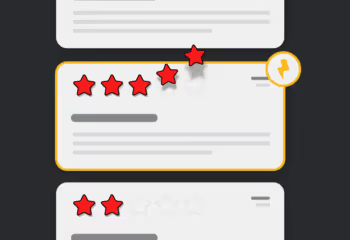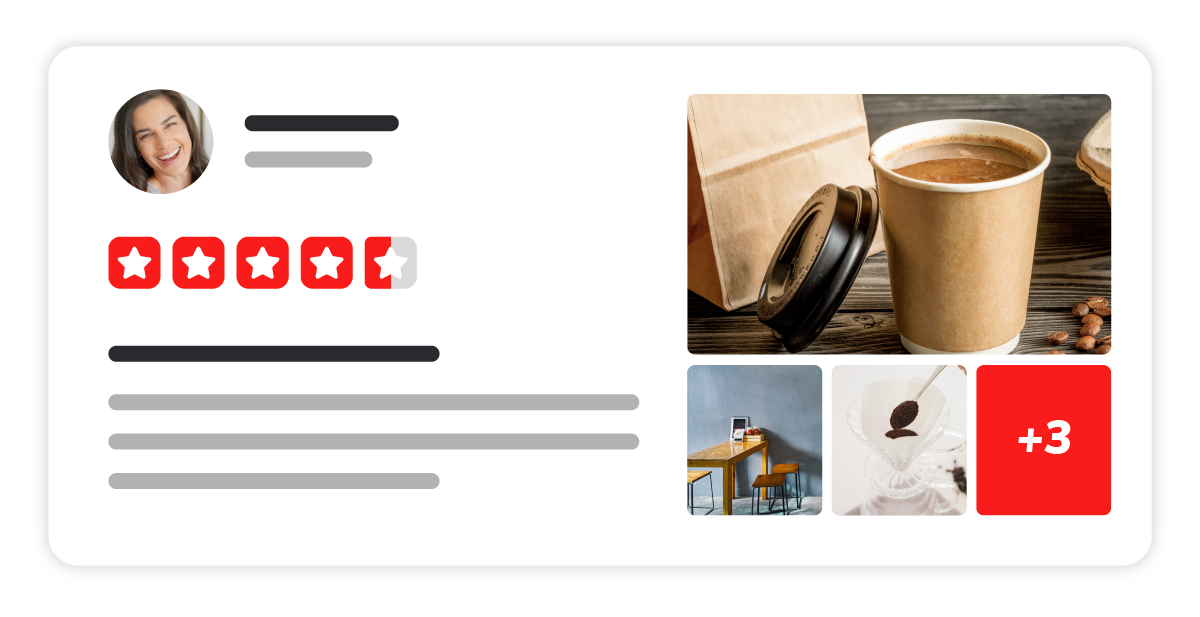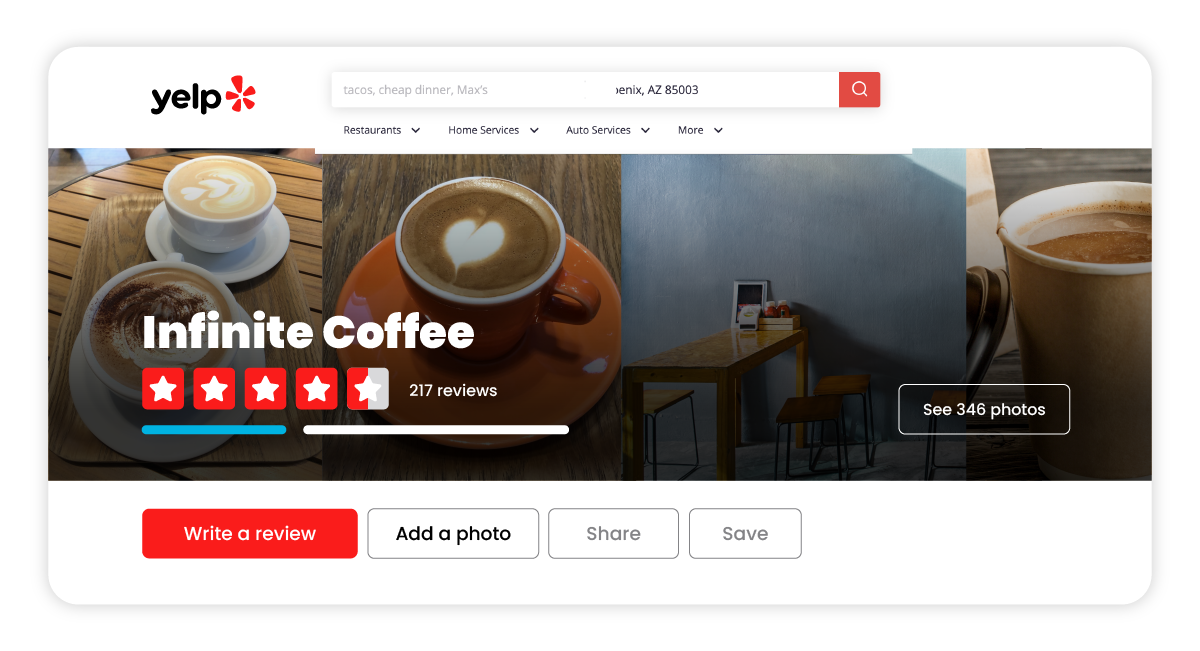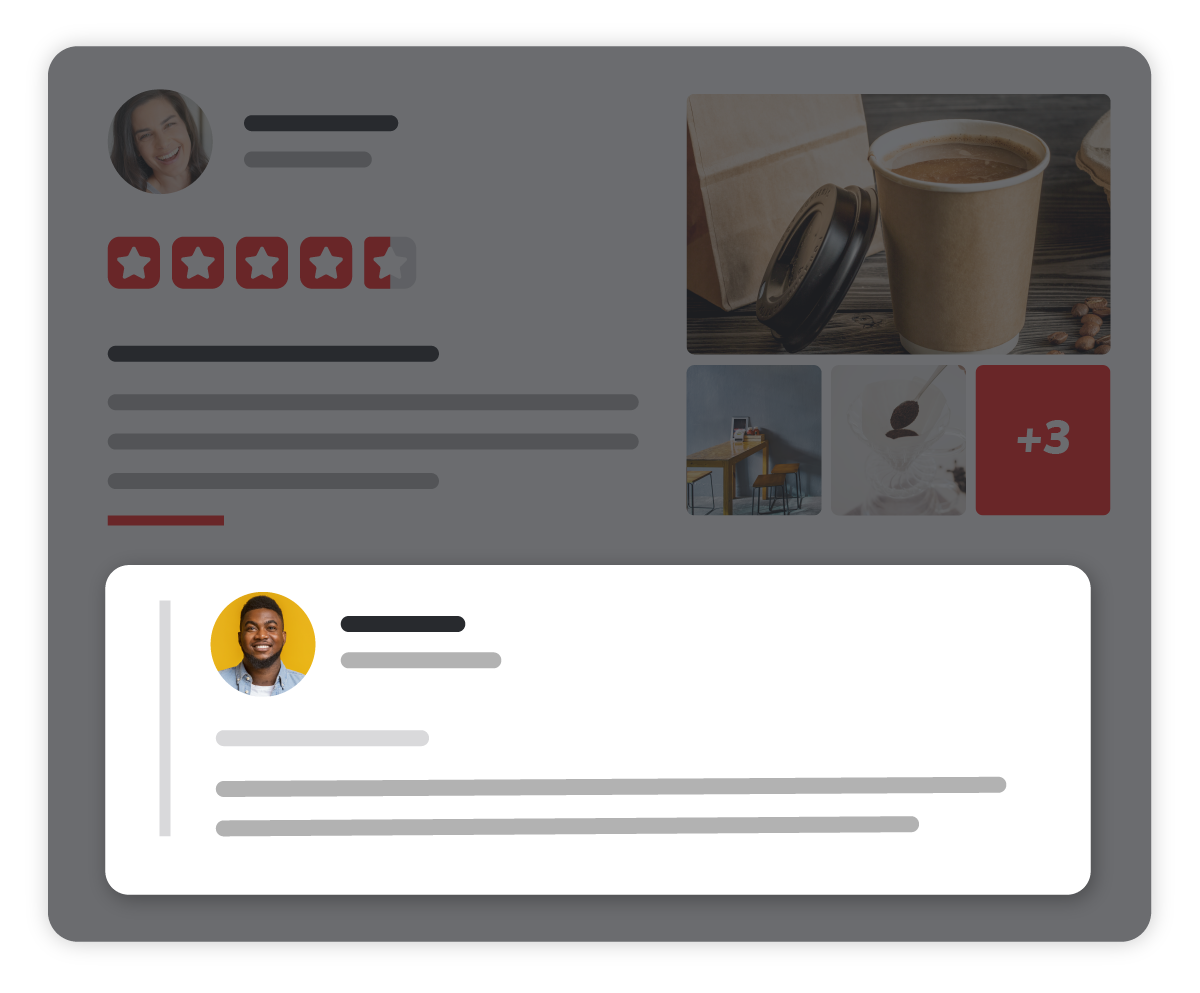
Articles
Why Yelp Reviews Matter (And How To Boost Yours)
August 4, 2021

Yelp boasts 224M reviews and a monthly average of 31M unique app visits. But unlike other platforms, 97% of people actually make a purchase after visiting the review site. So, yes - your standing on Yelp is important, especially if you’re a small business with a modest marketing budget.
So, here’s what you need to know about the platform, one person’s opinion on buying Yelp reviews, and top tips for boosting your business rating.
What is Yelp?
Word-of-mouth has long been considered one of the best ways to attract new customers. When the world started moving online in the early 2000s, word-of-mouth moved from the backyard to the world wide web. From that transition, in 2004, the online review site Yelp was born.
Chances are good that you've used Yelp to scroll through reviews and maybe even left some feedback yourself. It's a one-stop shop where you (and everyone else) can share their experiences of everything from that new restaurant in Austin or your latest gym experience in Boston. And these reviews are key to helping other people decide whether to buy or move on.
And it's not just Yelp in the review business. From Trustpilot and Google Reviews to Facebook and Tripadvisor, there are tons of places where customers can share their honest feedback about products and services. Among these, Yelp remains a leader. That's because it's known for providing longer-form reviews that tend to be more discerning and helpful (compared to quick one-liners).

With Yelp, your customers can give star ratings in addition to text reviews with pictures. Star ratings are a basic rating of one to five stars that allow you to quickly and easily rate your experience. And text reviews allow you to go deeper. They're the personal testimonials that can tell you how things really were, right down to the nitty-gritty details.
Is your Yelp star rating important?
You bet! Yelp uses the star rating from each of your reviews to calculate an average rating. And it shows it to anyone who scrolls by your business. Meaning, this rating is not only important but can actually affect how (and if) consumers see your Yelp business listing.

That's because lots of folks use the Yelp app to search directly for top-rated local products and services. And the top-rated businesses that match that query show up first.
For example, let's say you own an event rental company in Boston that consistently gets 5-star ratings. Your company is more likely to pop up in the app and on search engines like Google when people search for "best-rated event rental companies in Boston." And you're more likely to show up at the top of the list. It's that simple.
But aside from having top ratings, having lots of endorsements can also give your business the social proof that inspires prospective customers to click through. Think about it: Are you more likely to choose the Thai restaurant with six 5-star reviews or the one with hundreds of 4- and 5-star reviews?
So, yes, in a nutshell, how many stars your company has on Yelp can boost your company's visibility. And they can lead to more traffic, which leads to more sales.
Can (and should) you buy Yelp reviews?
Hearing that 94% of customers walk away from a business when they read a bad review might make you willing to do anything to keep the negative press off your page. Even your Yelp page.
And if you get a bad review, you might even be tempted to buy a good review that counterweights it. But that's not the route you want to go. Here's why.
Buying business reviews isn't the same as buying followers on social media, which, some (not us) might argue, "isn't the worst thing." But Yelp's whole platform relies on building trust off honest reviews. So, in my humble opinion, as soon as you start paying for your reputation, the foundation of trust that Yelp was built on starts breaking down.
Chances are good you use Yelp to help you find the hot new restaurant or experience. But if you found out that the reviews that convinced you to patron were all bought, would you still want to go? Would you still trust Yelp? Probably not. And your prospective customers would feel the same if they found out you were buying 5-star reviews.
But if you're still not convinced, here are three of the main reasons why you might want to reconsider buying your reputation and stick to real reviews:
- You'll lose your customers' trust. This one goes without saying. What's more, if you try to buy fake reviews, Yelp can flag your business and post a Consumer Alert on your page. You definitely don't want this. It's basically a big red box that appears on your Yelp page telling customers you were trying to cheat the system. These can be tough to recover from - even more so than from a bad review.
- You could waste money. Yelp has been cracking down on fake reviews. Meaning, if it suspects one of your reviews isn't real, it'll bump it to the second (third or even fifth) page. (You can think of it like the second page of Google - few people get there to see it.) Or it will delete the review completely. Either way, you wasted your money.
- It's against the law. If the first two reasons weren't enough to convince you, here's the deal-breaker. According to the Federal Trade Commission, paying for positive reviews without acknowledging that you did is illegal. And if Yelp suspects you've been buying reviews, you could be substantially fined. Some companies have used bribes, thinking it's a more honest way to get good reviews. But if you're saying something like, "Get 25% off our product, when you review us on Yelp!" that's buying.
So, let's look at what you can do instead.
How to get more (and better) Yelp reviews
Of course, we'd all like to only get positive reviews. But that's not always realistic. Even when you provide every customer the white-glove treatment, some of them will still find something to complain about.
But when it happens, know that a few bad reviews won't kill you. So, don't worry too much about "fixing" them. Instead, focus that energy on turning your customers into raving fans (and getting those fans to write positive reviews about you).
Here's how:
1. Give 5-star service
The best way to encourage good reviews (and prevent bad ones) is to give every customer that walks in your door, calls your business, or lands on your website a 5-star experience. Period.
Make sure your entire company consistently makes time to level up so that every team member can provide the same world-class experience. This could look like cross-training your employees on tasks outside their job description (like answering support tickets).
Plus, you can always try to get ahead of a bad review by giving customers a way to air their grievances offline. For example, every time a customer reaches out or buys something from you, send them a survey. That way, they have an easy way to provide feedback without needing to go to Yelp.
🔥 Tip: When you've found the best practices to create a 5-star experience, document them in Trainual! That way, everyone on your team can easily get up to speed with how to provide world-class service. Try for free.
2. Activate your Yelp page
Don’t just let your Yelp page passively exist. Instead, activate your page and take control over what people see about your business online!

Once activated, you can think of your Yelp page as your very own virtual window display. Meaning, what would you want to see if you were searching?
For example, you can add colorful photos of your employees and write out compelling product descriptions. Then, add the basic info your customer needs to know to actually buy from your business, like your hours of operation, customer support phone numbers, and more.
🔥 Tip: If you haven’t claimed your Yelp page already, you can do so by going to biz.yelp.com. (Don’t worry - it only takes a minute!)
3. Show happy people
In addition to adding your best product photos, you can also show off pictures of your experience. For example, if you're a restaurant, share photos of happy customers eating in-house (with their consent, of course). Or, if you service pools, show off friendly employees working on a real customer's pool.
For people visiting your Yelp page for the first time, this is your chance to make a great first impression. And it doubles as an opportunity to dissuade unhappy customers from leaving a bad review. Wherever possible, try to make these pictures quality, clean, and clear (AKA no blurry, poorly lit photos). And whatever you do, don't pose them (that won't help build trust).
4. Respond to Yelp reviews
This one should go without saying (and applies to any social media platforms your business uses). But if your customers take the time to engage with you, you should take the time to engage with them. And that goes double if they're asking specific questions about your business or product.
For starters, this helps your customers feel seen and valued. But it shows others that you care. Meaning, it's an incredible opportunity for you to promote (and set the record straight) about what you do.

5. Put positive Yelp reviews on your website
Testimonials are probably the most important copy you'll circulate. Because it gives people that final push to buy your product or service. So, put them front and center where people are already considering your business, like your other social platforms and website! Don't just wait for someone to stumble upon the praise.
Plus, when customers see how much other customers rave about your business, it creates a herd mentality. And they're more likely to leave you a raving review as well.
You can even add a Yelp badge to your website under these testimonials. That way, all customers have to do is click the badge, and they land straight on your Yelp page, ready to review! To add your Yelp badge, simply click on the "review badges" tab in your business account, then copy and paste the code snippet into your website. Voila!
6. Ask customers for a review
It's surprising how many small businesses don't bother asking customers for reviews. But if you don't ask, the answer will always be "no - I won't review you." Not because your customers are trying to be mean, but because most of them won't think about it unless they're upset!
And per our point earlier about avoiding bribery, there are better (more legal) ways to prompt people to submit a review. Sure, you can always use the overt, "Review us on Yelp!" But that will leave you rolling the dice about what kind of reviews you're going to get.
Instead, try saying something like, "We're now on Yelp and would love to hear what you think of us!" to encourage more reviews. Or, prompt a positive review by saying, "Love our small business? We'd love to hear why on Yelp!"
You already know that your reputation is the key to your business' success. And it's especially important if you're a small company just getting off the ground.
But before you freak out about a bad Yelp review, remember they happen. And the best way to combat them is to understand how Yelp works. Plus, encourage your raving fans to share what they love about your business with everyone they know (and some people they don't know)!
Similar Blog Posts











